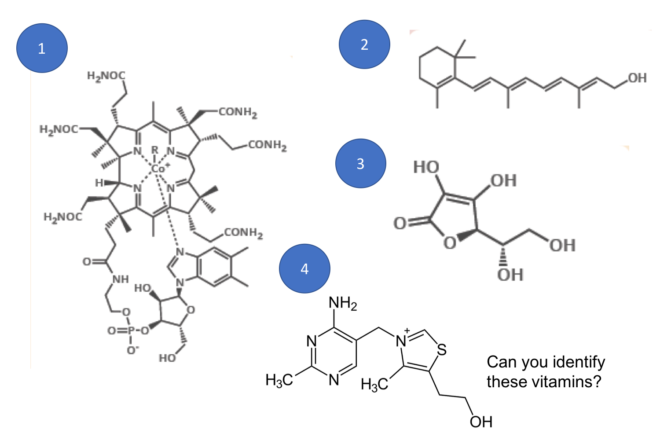Vitamins play a crucial role in building axon fiber and facilitating synaptic transmission but have to be ingested to become available to the brain. Surprisingly, little has been done to study the impact of these micronutrients on brain dynamics.
Building the brain with its miles of axons and billions of connections is a substantial construction project. Just as trucks and drills are crucial to laying highways and bridges, a host of molecular machinery are crucial for construction of neuronal highways and synapses. In some cases, removing or tampering with a particular tool completely stops the growth of life itself. And sometimes alternatives kick in. In the end, however, the better the tools the better the system can be built. Many of these heavy lifting functions in cells are carried out by proteins. Others are carried out by vitamins. Even though proteins are encoded in the genome humans are only able to synthesize 11 of the 20 amino acids required to build them (unlike many plants and bacteria that can synthesize all 20). The rest have to be ingested. As for vitamins – our cells can’t synthesize them at all and they must all be mined from our blood streams and come only from diet. What you eat matters for the construction and function of your brain.
Yet we don’t usually think much about vitamins with respect to the brain. In 1988, a decade before the effects of most vitamins on the brain had been probed in rats and mice, David Benton at the University of Swansea in Wales had studied the effects of vitamin supplements on the test performance of school children in the UK, studies that were subsequently repeated in the United States in the following decade. Most of the studies reported a modest increase in non-verbal IQ of 2-3 points on average. However the increase was not uniform, and was largely contributed by a fraction of the students who showed increases as large as 16 points – this is not a trivial difference. In some studies where diet was recorded, these tended to be poorer students whose normal diets were far more impoverished than the others.
See related post Dendrite Complexity and Intelligence
There are connections between vitamins and mental health. Depression for instance has been associated with vitamin D deficiency. Some vitamin deficiencies result in dementia symptoms.
So what do these vitamins do?
Vitamin B12
Arguably the most important activity in the brain has to do with electrical signaling between neurons. Axons are essential in sending these signals. Even a slight vitamin B12 deficiency results in poorer quality of myelination, which is the insulation axons required to propagate these signals effectively. When myelination is poor, signal quality is poor.
Even a slight deficiency of B12 has been found to lead to fatigue, fogginess and depression. Chronic deficiency can cause dementia and permanent damage to the brain. Symptoms of dementia include trouble with recalling recent events or recognizing people and places, finding the right words, solving problems, planning and carrying out simple tasks, exercising judgment, and controlling moods and behavior. Basically, it means functioning at a substandard level across virtually every dimension. B12 is incredibly important for brain health, but it isn’t the only important vitamin.
Vitamin A
Researchers at the Nutrition & Neurosciences laboratory at the University of Bordeaux in France recently studied the impact of Vitamin A deprivation and subsequent reintroduction in rats. They found that deprived rats had 32% fewer new cells in the hippocampus compared to rats fed a diet containing adequate amounts of Vitamin A.
The deprived rats also did a lot worse in a spatial memory task where they had to learn to swim around a tank marked with cues to find a hidden platform. The deprived rats took several days of being thrown in the water maze to start getting better at finding the platform, while the rats with regular levels of Vitamin A started to get better at the task even in a day. And although the Vitamin A deficient rats began to eventually learn and improve, they never got as good. On average they swam around longer, covering 25% more distance before they got to the platform.
The kicker of course, was that when Vitamin A was added back in their diets for 4 weeks, these rats stepped it up, performing very well on the water maze task and making new neurons at the same rate as the control rats, perhaps even overcompensating by making more.
Vitamin C
Similar experiments with Vitamin C were conducted in 2009 by researchers in the Department of Medicine at Vanderbilt University. They found that with just one dose of Vitamin C, middle-aged mice improved ~15% in the efficiency with which they located the platform. Though these results weren’t nearly as dramatic as the prolonged Vitamin A treatment, it is remarkable that a statistically significant effect can appear in just one treatment. Vitamin C is also thought to have some role in the production of new neurons and in their growth.
Much is still unknown about the different ways our vitamins, or even our diet in general, impact brain health. We have a lot to learn and unfortunately there are no significant studies of EEG under different dietary conditions that look into the specific effects of different micronutrient deficiencies on our brain dynamics. If our understanding of vitamins B12, A, and C are any indication, however, vitamins are essential and what you eat matters for the outcomes our brains produce – maybe a lot more than we realize.
See related post Your Brain from Noodles to Nuts

